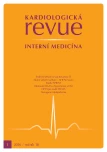The role of sitagliptin in the treatment of type 2 diabetes based on the results of the TECOS study
Authors:
M. Kvapil
Authors‘ workplace:
Interní klinika 2. LF UK a FN v Motole, Praha
Published in:
Kardiol Rev Int Med 2016, 18(1): 52-54
Category:
Cardiology Review
Overview
TECOS is a randomised, double-blind study, which involved 14,671 patients, where either sitagliptin or placebo were added to their existing therapy. Open-label use of antihyperglycaemic therapy was encouraged as required, aimed at reaching individually appropriate glycaemic targets in all patients. The primary cardiovascular outcome was a composite of cardiovascular death, nonfatal myocardial infarction, nonfatal stroke, or hospitalisation for unstable angina. During a median follow-up of 3.0 years, the primary outcome occurred in 839 patients in the sitagliptin group (11.4%; 4.06 per 100 person-years) and 851 patients in the placebo group (11.6%; 4.17 per 100 person-years). Sitagliptin was non-inferior to placebo for the primary composite cardiovascular outcome (HR 0.98; 95% CI 0.89–1.08; P < 0.001). Rates of hospitalisation for heart failure did not differ between the two groups (HR 1.0; 95% CI 0.83–1.20; P = 0.98). There were no significant between-group differences in the rates of acute pancreatitis or pancreatic cancer. Among patients with type 2 diabetes and established cardiovascular disease, adding sitagliptin to their usual care did not appear to increase the risk of major adverse cardiovascular events, hospitalisation for heart failure, or other adverse events. Thanks to the TECOS study, sitagliptin has become an antidiabetic agent with significant data on both efficacy and safety. These two properties should be differentiated and evaluated separately. The efficacy of sitagliptin has been demonstrated by a set of randomised, placebo-controlled Phase II and III studies. The TECOS study confirms its safety. Gliptins are a big step forward in the treatment of diabetes with significant benefits. There are no obstacles to the inclusion of this group as the second choice after metformin.
Keywords:
DPP4 inhibitors – sitagliptin – TECOS – diabetes type 2 therapy
Sources
1. Du Q, Wu B, Wang YJ et al. Comparative effects of sitagliptin and metformin in patients with type 2 diabetes mellitus: a meta-analysis. Curr Med Res Opin 2013; 29: 1487– 1794. doi: 10.1185/ 03007995.2013.833090.
2. Zhan M, Xu T, Wu F et al. Sitagliptin in the treatment of type 2 diabetes: a meta-analysis. J Evid Based Med 2012; 5: 154– 165. doi: 10.1111/ j.1756-5391.2012.01189.x.
3. Goldstein BJ, Feinglos MN, Lunceford JK et al. Sitagliptin 036 Study Group. Effect of initial combination therapy with sitagliptin, a dipeptidyl peptidase-4 inhibitor, and metformin on glycemic control in patients with type 2 diabetes. Diabetes Care 2007; 30: 1979– 1987.
4. Green JB, Bethel MA, Paul SK et al. Rationale, design, and organization of a randomized, controlled Trial Evaluating Cardiovascular Outcomes with Sitagliptin (TECOS) in patients with type 2 diabetes and established cardiovascular disease. Am Heart J 2013; 166: 983– 989. doi: 10.1016/ j.ahj.2013.09.003.
5. Scirica BM, Bhatt DL, Braunwlad E et al. The SAVOR-TIMI 53 Steering Committee and Investigators. Saxagliptin and cardiovascular outcomes in patients with type 2 diabetes mellitus. N Engl J Med 2013; 369: 1317– 1326. doi: 10.1056/ NEJMoa1307684.
6. Green JB, Bethel MA, Armstrong PW et al. TECOS Study Group. Effect of sitagliptin on cardiovascular outcomes in type 2 diabetes. N Engl J Med 2015; 373: 232– 242. doi: 10.1056/ NEJMoa1501352.
7. Engel SS, Golm GT, Shapiro D et al. Cardiovascular safety of sitagliptin in patients with type 2 diabetes mellitus: a pooled analysis. Cardiovasc Diabetol 2013; 12: 3. doi: 10.1186/ 1475-2840-12-3.
8. Kvapil M. Postavení fixní kombinace antidiabetik v terapii. Remedia 2013; 23: 2– 5.
9. Souhrn údajů o přípravku. [online] Dostupné z: http:/ / www.sukl.cz/ modules/ medication/ detail.php?code=0028734&tab=texts.
10. Souhrn údajů o přípravku. [online] Dostupné z: http:/ / www.sukl.cz/ modules/ medication/ detail.php?code=0119921&tab=texts.
11. Saenz A, Fernandez-Esteban I, Mataix A et al. Metformin monotherapy for type 2 diabetes mellitus. Cochrane Database Syst Rev 2005; 20: CD002966.
12. Hirst JA, Farmer AJ, Ali R et al. Quantifying the effect of metformin treatment and dose on glycemic control. Diabetes Care 2012; 35: 446– 454. doi: 10.2337/ dc11-1465.
13. Effect of intensive blood-glucose control with metformin on complications in overweight patients with type 2 diabetes (UKPDS 34). UK Prospective Diabetes Study (UKPDS) Group. Lancet 1998; 352: 854– 865.
14. Blonde L, Dailey GE, Jabbour SA et al. Gastrointestinal tolerability of extended-release metformin tablets compared to immediate-release metformin tablets: results of a retrospective cohort study. Curr Med Res Opin 2004; 20: 565– 572.
15. Lu J, Zang J, Li H. Impact of three oral antidiabetic drugs on markers of β-cell function in patients with type 2 diabetes: a meta-analysis. PLoS One 2013; 8: e76713. doi: 10.1371/ journal.pone.0076713.
16. Abbasi F, Chu JW, McLaughlin T et al. Effect of metformin treatment on multiple cardiovascular disease risk factors in patiens with type 2 diabetes mellitus. Metabolism 2004; 53: 159– 164.
17. DeFronzo RA, Okerson T, Viswanathan P et al. Effects of exenatide versus sitagliptin on postprandial glucose, insulin and glucagon secretion, gastric emptying, and caloric intake: a randomized, cross-over study. Curr Med Res Opin 2008; 24: 2943– 2952. doi: 10.1185/ 03007990802418851.
Labels
Paediatric cardiology Internal medicine Cardiac surgery CardiologyArticle was published in
Cardiology Review

2016 Issue 1
Most read in this issue
- Proton pump inhibitors – new molecules, new knowledge
- What to use in patients with ischaemic heart disease and atrial fibrillation – anticoagulation, antiaggregation or both?
- Hyperuricaemia, cardiovascular diseases and heart failure
- Cardiac cachexia
